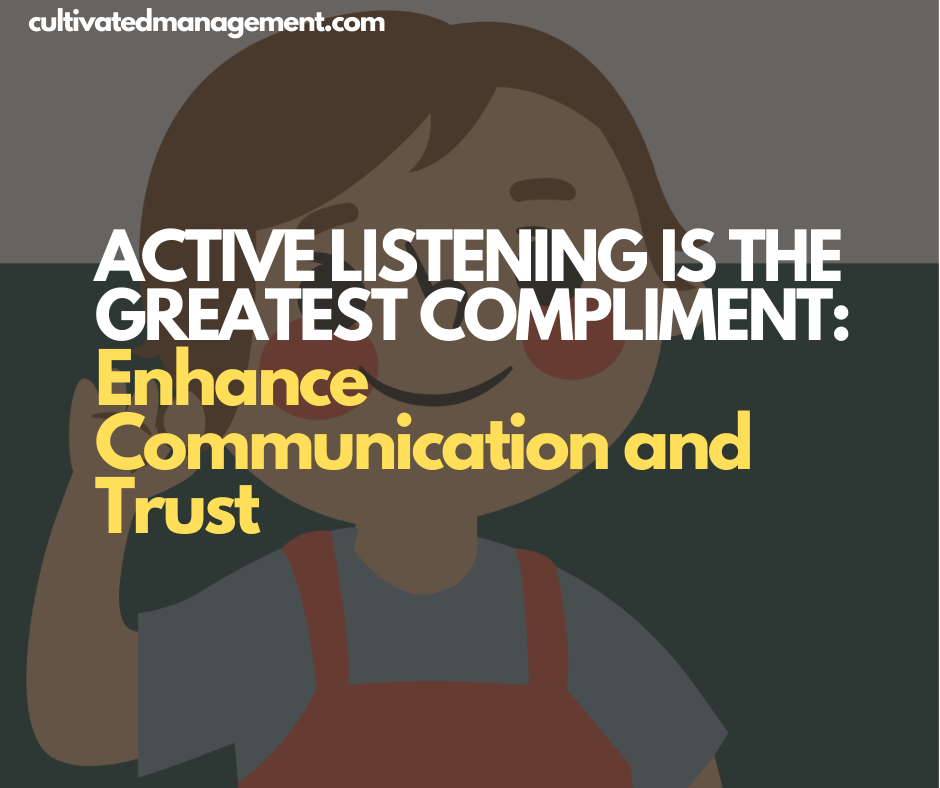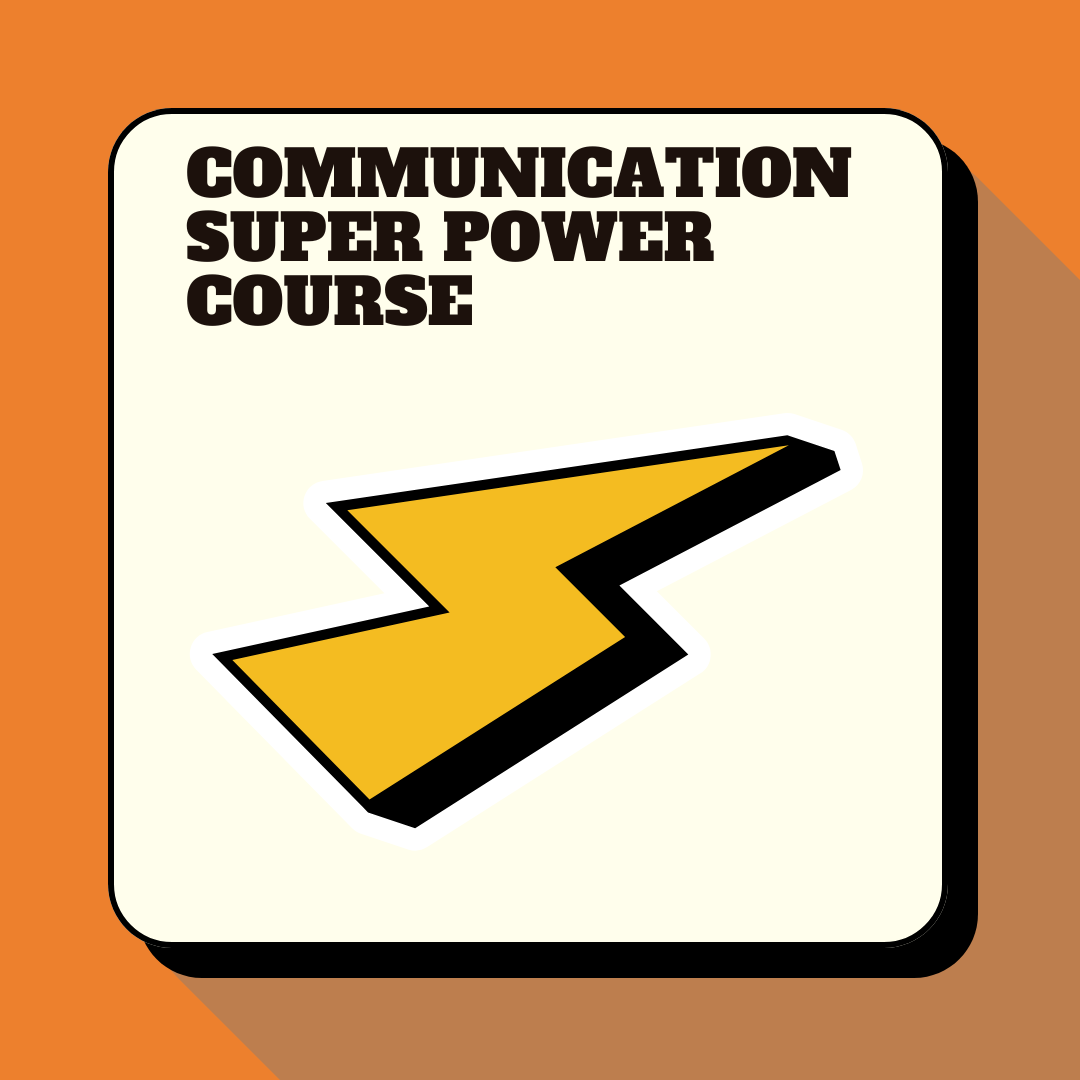Active Listening Is the Greatest Compliment: Enhance Communication and Trust
Learn how practicing active listening strengthens relationships, builds trust, and improves collaboration in the workplace

Active listening is the greatest compliment you could give someone; your attention, your focus, your care.
“Listening is the greatest compliment”
Bob Proctor, Wealth Coach
I agree with Bob Proctor – active listening is the greatest compliment you can give someone. Your full, undivided attention.
Doesn’t it make you feel good when someone listens to you? Doesn’t it make you feel rubbish when you know someone is not listening to you?
At work there will be loads of times when you need to listen to people. One2Ones, meetings, interviews, ad-hoc chats. Being the person that listens will set you apart. And this starts with active listening – not just hearing, but actually listening and processing and digesting what has been said.
Success in communication is not just about transmitting information, it’s about receiving it too.
Many managers tell their teams that they’re "always available for a chat", or "don’t hesitate to book a meeting", or "grab me any time" – only to not accept the invite, not listen or start talking about themselves.
Effective employees listen. And respond.
But were you ever taught to listen?
I remember my teachers telling me to listen more, but I don’t recall being taught how to do it.
And there’s a huge difference between hearing and listening. They are two different things.
Here’s how to become great at active listening. The following is covered in-depth in my communication workshop. You can find details of the communication workshop here.
Turn and Face
If you see a child walk up to someone and talk to them, you often see the adult give that child their full attention, indicated quite clearly by the adult turning their whole body to face the child, whilst maintaining eye contact.
Yet, if you watch somebody in the office walk up to a colleague, you’re likely to see that person continue to read their screen, or shuffle their papers, or read their book.
The first step to being an active listener is to turn and face, and give full attention to the person you are listening to.
Try it.
Next time someone comes up to talk to you, turn your whole body to face them, ignore your screen, or paperwork or book. Turn and face. And smile.
If you're remote, then do the same - have your camera on, ensure your camera is on the same screen as the recipient is (so you're not looking to the side), don't type emails in the background, or surf the web. Turn and face.
Be prepared for active listening
Listening is NOT passive. It is an active activity (hence it’s called Active Listening) and requires you to be present. To be present, you have to be active and ready to listen.
I talk a lot about the listener doing most of the communication and it being your job to engage the listener, however, the listener must also share the responsibility for effective communication.
The listener must be willing to listen. Active listening is about an active participant in the communication.
Great conversations happen when both parties are taking responsibility for listening and communicating.
To do this you must think about what the other person is trying to say, not how you are going to react or what you’re going to say next. Or what they look like, or what you’re having for tea, or that you forgot to phone your mum.
We’ve all spoken to people like that – they are always trying to jump in, interrupt, make a point, over talk and shut others down. Don’t do that. Learn to wait.
Sometimes you might need time to get yourself physically or mentally prepared to listen. Let’s say you’ve got a very delicate conversation booked in with a direct who’s having a hard time. That requires you to be on top form – alert, ready, listening.
Some conversations are high in emotion so acknowledge these emotional states. Respond (not react) to them. Be aware of emotions and if needed – call quits on a conversation that gets too emotional, or take a break, or change the topic, or suggest an alternative time to chat.
If things get super heated – sometimes cooling off is needed.
A good listener acknowledges their own emotional state – is now a good time? Am I on top form? Should I postpone?
They also become really good at reading other people’s emotional states and responding to them.
Active listening is about understanding the purpose of the communication, the audience (the other person) and the context (emotions, situation, mood, environment etc).
Learn more about Purpose, Audience and Context in the Effective Communication Course.
Be Interested
I was once stuck in a conference track in one of the world’s most boring talks.
Instead of getting mad and angry that I’d chosen the seat in the middle of the row, in the middle of the room, I decided to just listen and be interested.
I made a mental note “Be interested. You might learn something”. You know what? It was ok in the end.
The same thing goes when active listening.
There are meetings, conversations and discussions you don’t need or want to listen to. But that’s not the point. Sometimes people just need you there, or an ear to bend, or to know that their manager/peer has got their back.
If you show your disinterest – you’ll show you’re not listening. Be interested. Tell yourself it’s interesting – show the other person that you’re interested. It may be fake, but it shows interest. The chances are you’ll become interested anyway.
Empty Your Cup
Bruce Lee talked about “emptying your cup”, so that it could be refilled.
He was talking about letting go of your own belief that you know everything and opening up to the possibility of learning from others.
This is sound advice when actively listening to someone.
How many times have you been in conversations or meetings and interrupted someone because you “already know what they’re about to say” and been way off the mark?
They were actually heading towards saying something else, or they had a new angle on it, or knew more than you gave them credit for.
I found myself, as a manager, doing this a lot – I had to train myself to stop. It’s still hard to stop myself jumping in. But the key points may arrive at any point in the other person’s communication.
Let them finish. It could be the very last word that pieces their point or argument together.
Don’t Be Defensive
Sometimes the conversation is about you, your team, your plans, your behaviours.
It can be easy to jump straight to being threatened by this and become defensive. Feedback is hard to take – and not everyone delivers it with grace and care.
I suggest you take the feedback on board. Digest it, thank them for giving you guidance on how to get better – and move on.
When listening to others try to control your defensiveness – it rarely leads to a positive conversation.
Be open to learning from anyone in the organisation, at any level. Active listening means letting go of your own thoughts, at least initially, and taking in what the other person is saying, even if its about you.
Piece it all together
Don’t just listen to facts and snippets of information. Piece it all together to form the main idea.
Not everyone is a good communicator, so hold fire on responding and take time to piece the main thread of their communication together.
After they have finished, take a moment and repeat back to them what they have said, but in your own words!
You should be able to convey the message back them in your own words – to their satisfaction. If you can do that – you have listened. It’s the acid test.
Active listening is more than simply hearing the words, it’s also about digesting them, processing them and opening your mind to what they are saying.
Listen Critically
Critical thinking is a skill missing from many workplaces.
“Yes” people (people who say “yes” to everything) are in all levels of the organisation.
Strategies that will never work can make it from idea to implementation to failed project without a single person asking “does this make sense?” or “what problem are we trying to solve?”.
They simply said yes all the time.
Effective employees are critical thinkers. And active listening requires active critical thinking.
- Is what they have just said always true?
- If they claim it is always true, then wouldn’t that make the opposite of it always false?
- Can I think of a time when what they said was not true?
As you listen, be questioning and thinking. In order to think critically, you must take in all of the details – you must actively listen, then understand the whole point – and critically assess it to make sure you have understood it.
Focus
Active listening requires your attention. You must resist distraction. You must focus.
Ever been speaking with someone who keeps checking their phone? Been in a meeting with someone who is on their laptop? Even been speaking with someone who keeps looking around and behind you? Annoying right?
Avoid distractions - this requires practice and awareness.
Take Notes
Sometimes you need to make notes. Sometimes it would be rude to make notes.
As much as you are actively listening, you’ll still not remember everything. Taking notes can be a good idea.
Make all notes 60 days proof. Learn shorthand maybe? Make up your own shorthand.
But don’t let note-taking take you away from listening.
Try not to use a laptop and keep as much eye-contact as possible. Give feedback that you are still listening such as head nods and other gestures and repeating words back.
Respond
Active listening requires being mostly silent and taking on board what someone else is saying, until it's your time to respond.
Listening for those main points and bringing it all together is the first step, but it also calls for a response. Not a reaction, but a response.
What that response is, depends on what is being talked about. It could be kind words to re-assure someone, or guidance on how to move forward, or more questions to clarify anything.
Or it may be you need to put a plan together, or organise a meeting, or put together more training sessions. Or it could be that you just sit quietly, give some non-verbal sign you're listening and give them some space.
Learn to respond. Not react.
If you are doing active listening you are paying attention, you are giving someone your time and awareness. You are paying them a compliment. You may learn something.
The more you listen, the more people will want to talk to you. This is both a good and bad thing.
As a manager your job is to listen and respond. But you’re not a counsellor, or a social worker, or a therapist. Listening is good. It pays to become good at it. But it also pays to know when someone needs professional support too.
Speak to your friendly HR team if you’re worried you’re doing more than just listening to everyday work issues.
Active listening is a superpower in the world of work – and the greatest compliment you could give someone.
Bibliography
- https://en.wikipedia.org/wiki/Active_listening
- Communication – Nicki Stanton (affiliate link)
- Executive Presence – Harrison Monarth (affiliate link)



